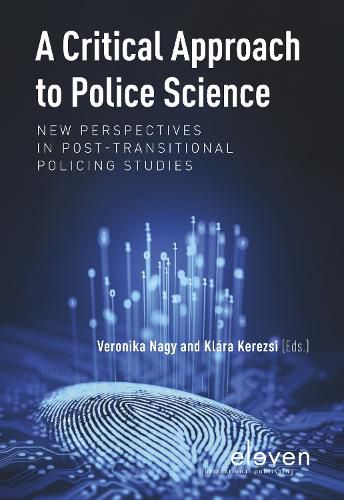Readings Newsletter
Become a Readings Member to make your shopping experience even easier.
Sign in or sign up for free!
You’re not far away from qualifying for FREE standard shipping within Australia
You’ve qualified for FREE standard shipping within Australia
The cart is loading…






This title is printed to order. This book may have been self-published. If so, we cannot guarantee the quality of the content. In the main most books will have gone through the editing process however some may not. We therefore suggest that you be aware of this before ordering this book. If in doubt check either the author or publisher’s details as we are unable to accept any returns unless they are faulty. Please contact us if you have any questions.
The social, economic and technological developments of the late modern society have radically changed policing approaches both at national and supranational levels. With the anti-terrorism discourse and the global crises of mobilities, the security needs of citizens is now at the pinnacle of government priorities. At the same time, traditional law enforcement faces an epistemological crisis through the digitalisation and privatization of security. Governments, and especially the police, are expected to either prevent or respond to security threats, and if necessary, to ensure order through rigorous measures. The traditional means of policing, however, is met with increasing difficulties to sustain their legitimacy on all fronts.
Regarding the current subject of public security, several challenges can be identified. The shifting relationship between organizational and management rules between the state and other governing bodies, the use of new technologies, and the fusion of different security units, such as intelligence services, the military, and the police, all contribute to new tensions in policing practices. These changes urge the need of a reflective policing science and the adaptation of existing theoretical approaches. Although several conceptual differentiations are made between policing practices, hardly any theoretical studies discuss the implication of current contextual differences between traditional welfare states and post-transitional societies.
This book provides a critical interdisciplinary approach through contextualized thematic analyses of policing practices after the digital turn. All topics are discussed from different conceptual perspectives, and will assess how digitalization, global threats and privatization have changed traditional policing approaches.
While challenging existing theoretical approaches in Anglo-Saxon policing studies, this editorial volume aims to promote critical law enforcement studies and the need for more empirical research and new conceptual methodologies in a digitized society.
$9.00 standard shipping within Australia
FREE standard shipping within Australia for orders over $100.00
Express & International shipping calculated at checkout
This title is printed to order. This book may have been self-published. If so, we cannot guarantee the quality of the content. In the main most books will have gone through the editing process however some may not. We therefore suggest that you be aware of this before ordering this book. If in doubt check either the author or publisher’s details as we are unable to accept any returns unless they are faulty. Please contact us if you have any questions.
The social, economic and technological developments of the late modern society have radically changed policing approaches both at national and supranational levels. With the anti-terrorism discourse and the global crises of mobilities, the security needs of citizens is now at the pinnacle of government priorities. At the same time, traditional law enforcement faces an epistemological crisis through the digitalisation and privatization of security. Governments, and especially the police, are expected to either prevent or respond to security threats, and if necessary, to ensure order through rigorous measures. The traditional means of policing, however, is met with increasing difficulties to sustain their legitimacy on all fronts.
Regarding the current subject of public security, several challenges can be identified. The shifting relationship between organizational and management rules between the state and other governing bodies, the use of new technologies, and the fusion of different security units, such as intelligence services, the military, and the police, all contribute to new tensions in policing practices. These changes urge the need of a reflective policing science and the adaptation of existing theoretical approaches. Although several conceptual differentiations are made between policing practices, hardly any theoretical studies discuss the implication of current contextual differences between traditional welfare states and post-transitional societies.
This book provides a critical interdisciplinary approach through contextualized thematic analyses of policing practices after the digital turn. All topics are discussed from different conceptual perspectives, and will assess how digitalization, global threats and privatization have changed traditional policing approaches.
While challenging existing theoretical approaches in Anglo-Saxon policing studies, this editorial volume aims to promote critical law enforcement studies and the need for more empirical research and new conceptual methodologies in a digitized society.